#a person with her face who was associated with the fbc already existed in jesse’s dimension. this was esther
Explore tagged Tumblr posts
Text


esther. an fbc scientist turned parautilitarian ever since she touched that petrified tree stump
#read tags for backstory#control#control remedy#control 2019#control game#remedy#remedy games#control oc#remedy oc#alan wake 2#remedyverse#remedy control#remedy connected universe#oc#my art#alan wake#control fanart#video game oc#sci fi oc#she was pulled from an alternate dimension into the main/jesse’s dimension after darling’s disappearance#however she did not possess paranatural abilities before this#she claims to be dr (cassandra) darling#a person with her face who was associated with the fbc already existed in jesse’s dimension. this was esther#but was killed years prior to the hiss. she was the one who touched the tree#the two alternate identities begin to merge in their memories as well as abilities#a certain someone at the fbc - who was close to esther - recognises her 👀 and has a mental breakdown 👍#her abilities can make her seem. evil#she can manipulate electricity to: conjure lightning. teleport. fly. and move with super speed??#idk I’m still figuring her out#sort of like an avatar aang situation. gentle in nature but relentless if provoked
9 notes
·
View notes
Text
the red telephone
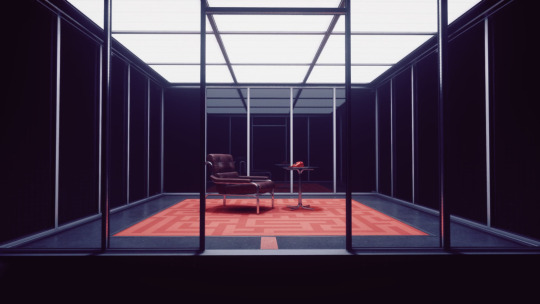
The thing about Control is that I don’t think I’ve ever played a game where I’ve felt such a vast difference between a game’s artistic and technical quality and its total lack of thematic and narrative depth.
There is a good case for saying that this oughtn’t to be a problem. It’s long been the case that if a video game is entertaining enough, any further ‘depth’ (by the standards established by other media) is unnecessary. This is why we don’t much care if the story isn’t good in Doom. The sense of being there and doing the thing is enough. But Doom isn’t drawing on influences bigger than itself. Clearly it’s been influenced by a variety of things — from Dungeons and Dragons to heavy metal album covers and Evil Dead and everything in between — but Doom is not referential, and it’s not reverential. Doom is complete unto itself. Control is not complete.
Horror films and ghost stories and weird fiction are best when they are about things. Think about The Turn of the Screw and The Thing and Twin Peaks and Candyman, to pick a few examples off the top of my head. They work not just because what we see and hear and read is mysterious. They are compelling because they have intriguing characters and thematic resonance. The Babadook is not just a story about a monster from a book for children. Night of the Living Dead isn’t just about, you know, the living dead. By comparison I find it hard to say that Control is about anything, but it presents itself as adjacent to this kind of work. It is a magnificent exercise in style which trades in empty symbols. It wraps itself in tropes from weird fiction in the hope of absorbing meaning by osmosis.
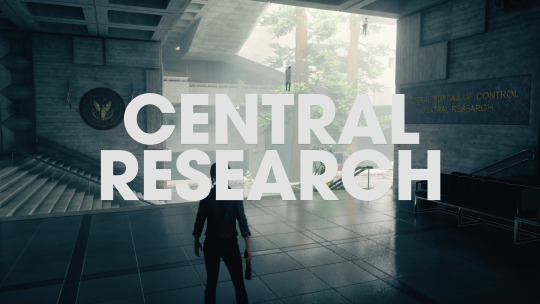
It feels like a wasted opportunity, because the setup is not without interest. You play as Jesse Faden, a woman supposedly beginning her first day on the job at the Federal Bureau of Control, a mysterious government organisation that deals in high-level paranormal affairs. The FBC is a feast of architectural and environmental detail: a vast Brutalist office complex with an interior that seems to be stranded in time somewhere around the mid-1980s. Everything is concrete and glass and reel-to-reel machines and terminal workstations. It’s frequently stunning.
Unfortunately most of the staff are missing because Jesse’s visit to their headquarters coincides with a massive invasion by the Hiss, a paranormal force which has taken over the building. The Hiss is a sort of ambient infection that turns people into mindless spirit-drones, chanting in an endless Babel. (Conveniently, most of those drones are present as angry men with guns. There are also zombies, and flying zombies, for variety.)
There is, obviously, more to Jesse than meets the eye. She spends a lot of time talking to someone nobody else can see. But there isn’t that much more to her. Like every other character in the game she is a monotone. There is no reason to believe she has any existence outside the plot devised for her here. Similarly, the other characters you meet exist only as the lines they speak to you. It works only when the effect is entirely, deliberately flat: the most compelling person in the game is Ahti, the janitor with a sing-song voice and a near-indecipherable Finnish accent. He is nothing but what he is — he has no past, no future. He has all the answers, if only you knew what questions to ask.
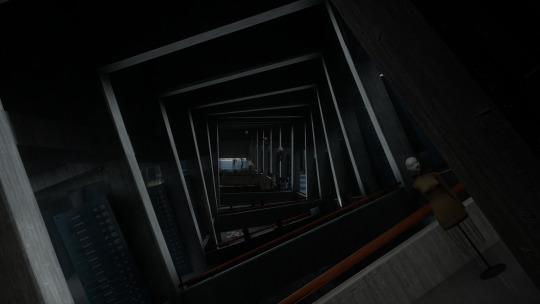
Control is undeniably stylish. The interiors are striking, vast, spacious. Even on the smallest scale the game has a great eye for little comic interactions via systemised physics. You can shoot individual holes in a boardroom table and watch the thing splinter apart into individual fragments. You can shoot a rolodex and watch all the little cards whirl around in a spiral. If a projector is showing a film you can pick the whole thing up and the film will reveal itself as an actual dynamic projection by spiralling and spinning madly across the nearest walls. (Speaking of film, the video sequences with live actors are great fun, and this being a Remedy game, there’s a fantastic show-within-a-show to be found on hidden monitors around the FBC.) And all of this before I mention the sound design — the music, which is full of concrète mechanical shrieks and groans — and the endless sinister chanting which fills the lofty corridors and hallways of this place, The Oldest House.
All of this is very, very good. And most of the time it’s quite fun to play. I mean, you can pick up a photocopier and fling it at enemies. It’s never not fun when almost anything can be used as a projectile. And then you get the ability to fly! At its best the combat in Control feels messy and chaotic — in a good way — but in a way that has little to do with typical video game gunplay. Staying behind cover doesn’t work because the only way to regain health is to pick up little nuggets dropped by fallen enemies, so most of the time you have to use your powers to be incredibly aggressive. The result is that often you feel like the end-of-level boss — a kind of monster — throwing yourself into conflict with a team of moderately stupid players who think they’re supposed to be playing a cover shooter circa 2005.
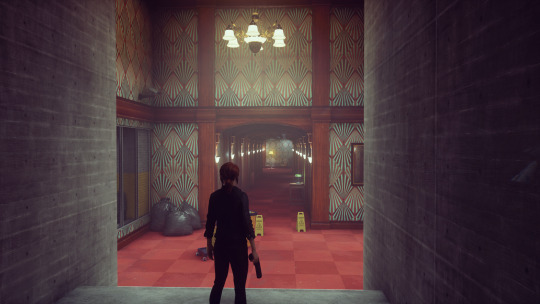
That you are given a gun at all seems odd. The gun feels like a compromise. The gimmick of a single modular pistol that can shape-change into a handful of other weapons is neat, but those weapons are just uninteresting variations on the same old themes: handgun, shotgun, machine gun, sniper, rocket launcher. The powers are more interesting and powerful. But of course the gun has to be there; can you imagine them having to go out and sell this game without a gun in it? What would Jesse be holding on the front cover?
A gun is an equaliser. It evens the odds between the weak and the strong. But if you’re already strong it doesn’t feel worthwhile. You’re clearly so much more powerful than everyone else you meet in Control that after a while you begin to wonder why the game is also frequently quite hard. The omission of any difficulty settings is notable in a game of this type; it suggests that the developers were committed to their vision in the way that might recall Dark Souls. In fact the hub-like structure of the game is pretty clearly influenced by From Software’s games, and though it’s nowhere near as challenging, it seems to be reaching towards the same kind of thing.
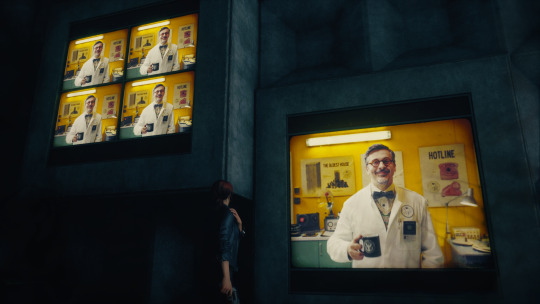
It’s a game which demands you take it seriously as a crafted object. But then it has all these other elements cribbed from elsewhere — the generic level-based enemies with numbers that fly off them when shot, and the light peppering of timed/semi-randomised side activities, both of which made me think of Destiny. So there’s games-as-service stuff wedged in here too, and it doesn’t sit at all comfortably with this supposedly mysterious, compelling world that you’re supposed to want to explore.
This isn’t a horror game. There are one or two enemies with the potential to induce jump scares, but given that you can always respond with overwhelming force, it’s never really unsettling. But it’s clearly been inspired by horror. A source often mentioned as an inspiration for Control is the internet horror stories associated with the SCP Foundation wiki. From there the game borrows the idea that unlikely everyday objects can become sources of immense cosmic power — hence we see items like a rubber duck, a refrigerator, a pink flamingo, a coffee thermos imprisoned behind glass as if they were Hannibal Lecter. A pull-cord light switch becomes an inter-dimensional portal to an otherworldly motel. The great part about this is that these little stories can be told effectively in isolation; it’s always interesting to come across another object in the game and to discover what it does. (The fridge is especially unpleasant.)
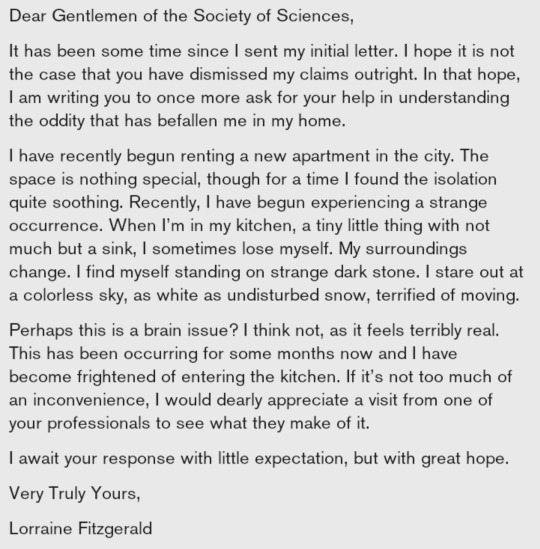
But experiencing this kind of thing in the context of an action game is entirely different to stumbling it on it online. SCP Foundation is pretty well established now, but still, there’s a certain thrill in stumbling across something written there in plain text, titled with only a number. When those stories are good, they can be really good. Given the relative lack of context, and the absence of any graphical set-dressing, there’s room for your imagination to do the heavy lifting.
In Control these fine little stories are competing for attention with all the other crazy colourful stuff going on in the background. You read a note and you move on to the next thing. You crash through a pack of enemies and the numbers fly off them. There’s never a sense of the little story fitting into an overall pattern. That lack of a pattern can be forgiven in the context of a wiki. In Control, these stories start to feel irrelevant when you never come across an enemy you can’t shoot in the face. In a different format, or a different type of game, this kind of rootless narrative might be more compelling.
But what is this game about? There’s a sister and brother. A sinister government agency. Memories, nostalgia. A slide projector. It’s all so difficult to summarise. When I think about the game all these words seem to float around in my head, loosely linked, but not in a way that suggests any kind of coherence. The game always seems to be reaching towards some kind of meaning but it only ever feels hollow. It feels flat. Yet all the elements that are good about Control must be made to refer back to these hollow, flat signifiers. Sometimes the flatness works for the game, but mostly it doesn’t.
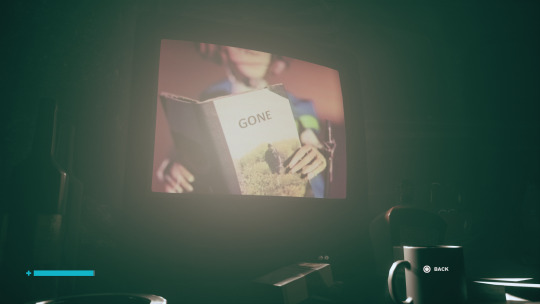
Today, it’s hard to see that anyone could see the point in establishing a website like SCP Foundation if it didn’t already exist. Viral media is not what it was in the first decade of the 2000s. Written posts that circulate on social media have a shorter half-life than ever. It’s almost impossible for any piece of writing over a few hundreds words to go viral in ways that go beyond labels like ‘shocking’, ‘controversial’, ‘important’, etc. ‘Haunting’ and ‘uncanny’ don’t quite cut it. This kind of thing doesn’t edge into public spaces in the way it used to via email inboxes, or message boards, or blogs.
Perhaps the weird stuff is still out there. Perhaps we only got better at blocking it out. With the arrival of any new viral content, today’s audience is mostly consumed by questions of authenticity, moral quality, and accuracy. If you think this creepy story might be ‘real’, you’re a mug. If you promote it you might be a dangerous kind of idiot. And that’s fair: there are a lot of dangerous idiots out there. Yet there’s something to be said for an attitude of persistent acceptance when it comes to the consumption of weird stuff on the internet. I know I become gluttonous when I come upon such things. I want to say: yes, it’s all true, every word. I’ve always known it’s all true.
4 notes
·
View notes